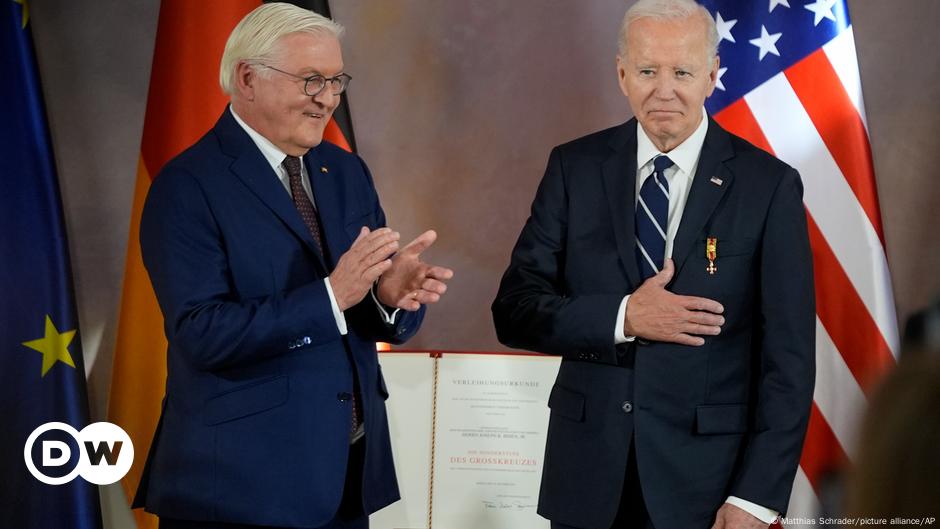Biden’s Farewell Tour: A Lasting Legacy in Trans-Atlantic Relations
As President Joe Biden embarks on his farewell tour with just a few months left in office, he finds himself reflecting on a presidency marked by a deep commitment to trans-Atlantic relations, particularly with Germany. After postponing his original visit due to Hurricane Milton, Biden made headlines last week in Germany, where he received the prestigious Order of Merit of the Federal Republic of Germany. This honor, presented by German President Frank-Walter Steinmeier, recognizes Biden as a "beacon of democracy" and highlights his decades-long dedication to strengthening ties between the U.S. and Europe.
Biden’s relationship with Germany is not just a political footnote; it’s a cornerstone of his presidency. His administration has navigated some of the most challenging global issues, from supporting Ukraine in its conflict with Russia to addressing the complexities of the Middle East. But as Biden prepares to leave office, many are left wondering: will he be the last president to prioritize these vital trans-Atlantic connections?
A Lifetime of Engagement
Born in 1942, Biden grew up during a time when the U.S. played a crucial role in helping West Germany rebuild after World War II. His political career, which began in 1972, has been shaped by the Cold War, with Germany often at the center of U.S. foreign policy. Michelle Egan, a professor at American University and an expert on U.S.-European relations, notes that Biden’s extensive experience—through NATO, the Munich Security Conference, and his time on the Senate Foreign Relations Committee—has uniquely positioned him as a leader deeply connected to Europe.
During his vice presidency under Barack Obama, Biden was instrumental in revitalizing the trans-Atlantic relationship, which had suffered during the previous administration. While Obama was popular in Europe for his diplomatic approach, it was Biden’s emotional ties to the continent that resonated with many European leaders.
Shared Challenges and Political Divides
The Biden administration has seen Germany emerge as a key ally, particularly in their joint support for Ukraine and their unified stance on Israel’s right to self-defense amid ongoing conflicts in the Middle East. However, both nations face significant domestic challenges that mirror each other. In the U.S., political polarization between Democrats and Republicans has created a contentious atmosphere, while Germany grapples with the rise of the far-right Alternative for Germany (AfD) party, reflecting a broader fracturing of political consensus.
Egan points out that both countries are also dealing with border issues and migration policies. Germany recently tightened its migration policies in response to domestic incidents, while the Biden administration has faced criticism over its handling of immigration at the U.S.-Mexico border.
The Future of Trans-Atlantic Relations
As Biden’s presidency nears its end, some analysts suggest he may be the last great trans-Atlantic president. Peter Sparding from the Center for the Study of the Presidency and Congress warns that the U.S. is shifting its focus toward the Indo-Pacific region, which could diminish Germany’s role in American foreign policy. This shift may lead to increased expectations for Germany to take on more responsibility for its own security and that of Europe.
"The German-American relationship will be different in the future, no matter who the president will be," Sparding explains. As the geopolitical landscape evolves, the dynamics of U.S.-Germany relations are likely to change, with Germany needing to adapt to a new reality where it cannot solely rely on the U.S. for defense.
A Legacy of Connection
As Biden continues his farewell tour, his legacy as a trans-Atlantic president is firmly established. His commitment to fostering strong ties with Germany and Europe has left an indelible mark on U.S. foreign policy. Whether or not future presidents will prioritize these relationships remains to be seen, but Biden’s tenure has certainly set a high bar for trans-Atlantic cooperation.
In the coming months, as Biden wraps up his presidency, the world will be watching closely to see how these relationships evolve and what they mean for the future of global diplomacy. For now, Biden’s farewell tour serves as a poignant reminder of the importance of connection and collaboration in an increasingly complex world.



